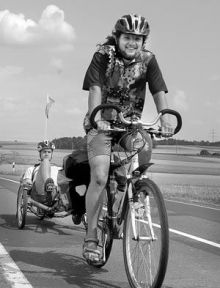The 5th European Partnership Bicycle Tour, in which 11 our compatriots took part, has finished in Brussels. The Day has already reported on the start of an ecological cycling tour on the roads of Germany and Belgium, during which the travelers were to borrow the experience of producing energy from alternative sources. 26 boys and girls (of which 11 were Ukrainians and 15 from the Federal Republic of Germany) ran about 1,000 kilometers in two weeks, acquainting themselves with the culture and the energy-saving expertise of Germany, the Netherlands, and Belgium.
“TILTING AT WINDMILLS”
The cycling tour started in Dresden. But the Ukrainian team, which reached Germany on a regular bus, had begun to study Germany’s alternative power generation when it was crossing the Polish-German border. The team could see new modern-day wind power plants on every 5th or 6th kilometer of the road. They were the same as the ones that stand conspicuously in the Ukraine promo clips made for Euro-2012.
Interestingly, Germany has today 21,600 wind turbines with an overall capacity of 27,200 MW. The cycling tour participants who had already been to Germany called this “tilting at windmills.” By contrast, the power of all Ukrainian wind plants is less than 50 MW. It takes about a million euros to install a classical wind turbine in Germany, and three units of this type supply electricity to an average 2,000 people. An installation may be owned by a business, a commune, or a private individual. In spite of the form of ownership, the “green” energy can be sold to the general grid. The prime cost of one kilowatt being 37 cents, the state buys it for 1 euro 20 cents, This allows the installation’s owner to quickly repay the credit for which he purchased it and even gain a profit.
In Ukraine, too, you can install non-commercial 75-kW-strong and up to 30-km-high wind power plants without any problems on your own land.
The wind and the sun account for the largest share of the energy produced in Germany from alternative sources. Quite popular are the so-called solar farms equipped with photovoltaic systems which convert solar radiation into direct current electricity. As the main problem of electricity saving is loss during the transportation, photovoltaics can be installed on house facades and roofs as well as other surfaces, which makes it unnecessary to transport electricity at long distances. The photovoltaics boom, which began in 2004, is still in progress.
Yet a coin has two sides. The “reverse side” of alternative power generation is a danger involved in the manufacture of the necessary devices and the eventual disposal of the latter. What also causes controversy and concern is the refusal of firemen to extinguish fire in the buildings where solar batteries were installed. This is caused by the high probability of a short circuit because these batteries contain chemical elements which resist the standard methods of fire extinguishing.
QUICK SHOWER, BOTTLES, AND BICYCLE TRAFFIC
A reverent attitude to nature is brought up in Germany not only ideologically but also economically by way of introducing high water and electricity charges. There were showers at the youth camps, where the cycling tour participants put up, but those who love luxuriating under warm water were disappointed with the time limit. For example, it cost a participant one euro (about 11 hryvnias) to spend four minutes of hot water treatment. Yet this is quite sufficient because a three-minute shower is considered the world economy standard.
It should be noted that the state has created all the conditions for its citizens to reap benefits from their care about the environment. For example, every large food shop in Germany has reverse vending machines for glass and plastic bottles. After the machine has automatically checked up the bottles, it issues a receipt that shows the discount. The buyer can always use this money to make payments at the supermarket checkout. The cyclists took an enthusiastic part in the process of a rational utilization of garbage and would scrap 40 to 45 empty bottles a day. The discount memo usually showed up to 10 euros (111 hryvnias). With due account of food prices, which are even lower than in Ukraine, the money earned on “garbage” was enough to buy a dessert for our entire team of 26 people.
It will be recalled that a wide-scale bicycle traffic campaign was launched in the Netherlands, and in a few years the experience of “unloading” the public transport and highways was taken up by the other EU countries. These counties have now the necessary infrastructure that includes bicycle lanes, parking lots, signs, and service stations. In Germany, every tenth road is adapted for bicycle traffic. In all the three countries, through which the cyclists rode, they could see a “promo bicycle” on which it is written how many calories an individual spends, how much gasoline and how many trees they will save if they cover a certain distance on a bike. Incidentally, you can see people of all walks of life riding bicycles in EU countries: professional cyclists and novices, small children and the elderly, the poor and the rich, urban and rural residents. Even a Bundestag member once joined the cycling tour on his bike. This Ukrainian-German project was under the patronage of Viola von Cramon, the Bundestag spokesperson for external relations. She has been to Ukraine more than once and is quite knowledgeable about the political situation in our country.
“I think Ukraine has a very good background, especially in engineering,” Ms. Cramon told The Day. “Instead of building coal procession plants, one can build wind turbines, solar batteries, and bio thermal installations. You should create a favorable financial situation so that people can invest in the ecological sector, for, by doing so, one can not only help the environment but also earn money on this. You should try to develop the concept of switching to alternative methods of power ge-neration.”







